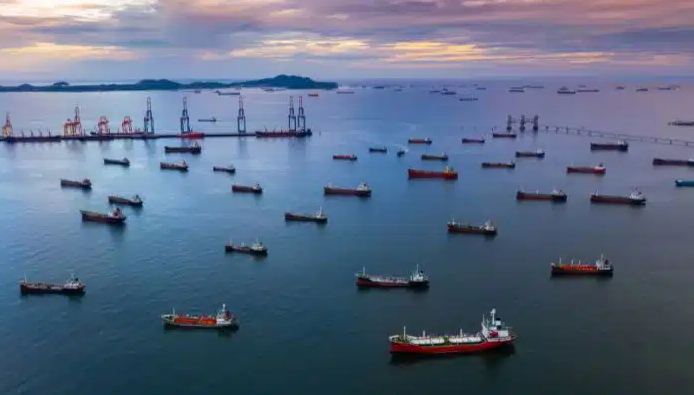新加坡是一个重要的石油储存和运输枢纽,该国扣留了许多无法通过检查的化学品和油轮,这一数字今年创历史新高。
随着俄罗斯越来越多地使用老旧油轮在没有西方保险的情况下运输原油和产品,亚洲最近加强了对没有安全设施的船只的打击。
在欧盟禁运和七国集团对俄罗斯向第三国出售石油的价格上限之后,亚洲目前是俄罗斯原油的最大目的地。
彭博社(Bloomberg)周三宣布,今年迄今为止,新加坡已扣留了近33艘未通过安全检查和严格检查的船只,并分享了地区港口管制组织东京谅解备忘录(Tokyo MOU)的数据。
这比新加坡在截至2019年的整整十年中扣留的所有油轮还要多。
数据显示,2023年4月,新加坡扣留了9艘船只,这是自2010年以来的最高记录。
据报道,2022年,新加坡扣留了28艘油轮。
根据彭博社分享的《东京谅解备忘录》数据,这些拘留大多发生在2022年下半年。
七国集团(G7)和欧盟表示,如果装载俄罗斯原油的货物希望使用西方的责任保险和融资,它们将禁止进口俄罗斯原油,并征收每桶60美元的价格上限,2022年下半年之后,“影子船队”或“黑暗船队”的油轮数量大幅增加。
随着运送俄罗斯石油的老旧油轮数量激增,中国山东当局加强了安全检查,特别是对抵达重要石油进口港青岛的船龄超过20年的老旧船只的安全检查,这些船只在港口扣留了数周。
去年,数量不同寻常的油轮改变了所有权,航运业官员和分析人士认为,这是俄罗斯在制裁制度下继续运输大量原油和愿意从俄罗斯石油贸易中获利的实体的推动。
“影子”或“黑暗”油轮船队一直在扩大,不仅包括运输受制裁的委内瑞拉和伊朗石油的油轮,还包括越来越多的俄罗斯石油和产品。

▲Representation Image
英文原文
Singapore, a significant hub for oil storage and transportation, has detained many chemical and oil tankers incapable of clearing inspections, a record high this year.
As Russia increasingly uses old tankers to ship crude oil and products without Western insurance, the crackdown on ships without safety features has recently strengthened in Asia.
Asia is currently the top destination for Russia’s crude oil following the EU embargo and the G7 price cap on Russian oil sold to third nations.
So, year to date, Singapore has held almost 33 vessels that have not met the safety checks and stringent inspections, Bloomberg declared on Wednesday, sharing data from the regional port control organization, the Tokyo MOU.
That is more than all the tankers detained by Singapore in the whole decade until 2019.
In April 2023, Singapore held nine vessels, the highest number recorded since 2010, per the data.
For 2022, Singapore reportedly detained 28 tankers.
Most of these detentions happened in the second half of 2022, per Tokyo MOU’s data shared by Bloomberg.
The “shadow fleet” or “dark fleet” of oil tankers significantly expanded in the second half of 2022 after the G7 and the EU said that they would be banning the imports of Russia’s crude oil and levy a price cap of $60 for a barrel if the cargoes with Russian crude wanted to use Western liability insurance as well as financing.
As the number of old oil tankers that ship Russian oil soared, the Chinese authorities in Shandong have increased the safety checks, especially on old vessels reaching the key oil import port of Qingdao, holding ships over 20 years old, for weeks, at the port.
Last year, an unusual number of tankers changed their ownerships in what shipping industry officials and analysts believe was a push from Russia to keep shipping significant volumes of crude and entities willing to earn profit from Russia’s oil trade in a sanctions regime.
The “shadow” or “dark” fleet of oil tankers has been growing to include tankers not only shipping sanctioned Venezuelan and Iranian oil but also increasingly larger volumes of Russian oil and products.
免责申明:本文根据SCMP, Oil Price等内容整理,如有误差,以英文为准;仅代表作者观点,不代表中国海员之家立场。其真实性及原创性未能得到中国海员之家证实,在此感谢原作者的辛苦创作,如转载涉及版权等问题,请作者与我们联系,我们将在第一时间处理,谢谢!联系邮箱:cnisu@54seaman.com

 联系我们人工客服
联系我们人工客服



















 :1391995811
:1391995811


评论 (0人参与)